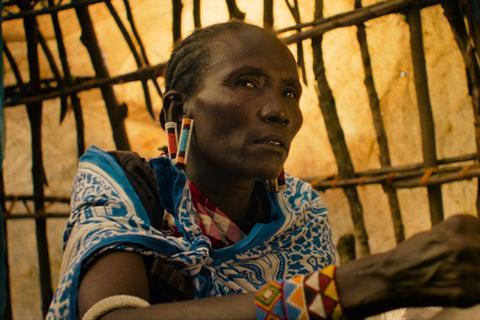Vincho Nchogu’s feature debut plays London’s First Feature Competition after premiering in Venice

Dir/scr: Vincho Nchogu. Kenya/Nigeria. 2025. 79mins
The lively feature debut from Kenyan filmmaker Vincho Nchogu belies its modest budget to tackle weighty themes with a deft balance of humour and pathos. One Woman One Bra tackles women’s rights and autonomy, but saves its most cutting commentary for tone-deaf Western NGOs and charitable organisations with an institutionally ingrained white saviour complex. It’s brisk, energetic and to-the-point; a persuasive argument for reclaiming a cultural narrative from those who have no right to it.
Brisk, energetic and to-the-point
The film, which competes for the Sutherland First Feature Award in the London Film Festival, premiered in Venice as part of the Biennale College Cinema strand. It’s the kind of small-scale but spirited title that could be warmly received on the festival circuit, where distinctive new voices from Africa remain relatively underrepresented.
The story takes place in a Kenyan village called Sayit (it was filmed in Nkosesia). It’s a time of celebration for the community, which is made up of Masai people who have settled there and farm the land. The smiling village Chief announces to a hall full of locals the happy news that they are each to be granted official title deeds for the land on which they live.
Peering through the window, literally and symbolically removed from her gathered neighbours, is 38-year-old Star (Sarah Karei). For her, the news of the land rights is bittersweet. An orphan of uncertain parentage who is not married, not only does Star fail to qualify for a title deed on her land, she also faces the very real possibility of losing her home. Her options, as laid out by the Chief, are limited. Either assert her inherited right by proving her bloodline, marry or come up with enough money to buy her own land.
Shortly after, when selling her handicrafts to a tourist shop, she spots a photograph of herself as a child on the cover of a glossy picture book titled ’Nomads of the World’. She seeks out the photographer, hoping that he might hold the clue to who her mother was. Drawing a blank on this angle of enquiry, in desperation she forges a partnership with a clueless NGO organiser (Davina Leonard) who patronisingly suggests that the support that Masai women need is not financial but physical – in the form of good, solid undergarments. Star is recruited to make a promotional video and comes up with the catchy slogan, “One woman, one bra.” But a misunderstanding puts her at odds with the other women of her village, and Star finds herself ostracised within her community.
Nchogu has an eye for droll visual comedy. In addition to the digs at Western charities forcing a chosen narrative onto African people, the film also pointedly asks questions about who has the right to profit from the use of an image. When the local people learn that Star’s picture is featured in the book, she becomes a minor celebrity. And the enterprising giftshop owner swiftly cashes in, charging the villagers to look at the photograph – in a moment of comic absurdity, they form a snaking queue out of the shop.
There’s an unvarnished quality to some of the filmmaking, in particular the occasionally blunt performances from a largely non-professional cast. (Nchogu cast and workshopped the film with women from a travelling theatre troupe). The writing can also feel a little choppy and episodic. But the picture looks terrific, with Nigerian cinematographer Muhammad Atta Ahmed making striking use of the vivid traditional Masai shawls that the women wear and the lush Kenyan countryside. The evocative score, which incorporates the voices of Masai singers, is another strong element.
Production company: Kilastory, Conceptified Media
International sales: Kilastory vision.asili@gmail.com
Producer: Josh Olaoluwa
Cinematography: Muhammad Atta Ahmed
Production design: Nuur Abdulkadir
Editing: Shannon C. Griffin
Music: Henrique Eisenmann
Main cast: Sarah Karei, Norng’aruani Kipuker, Amos Leuka, Irungu Mutu, Boniface Saitabau, Davina Leonard
























